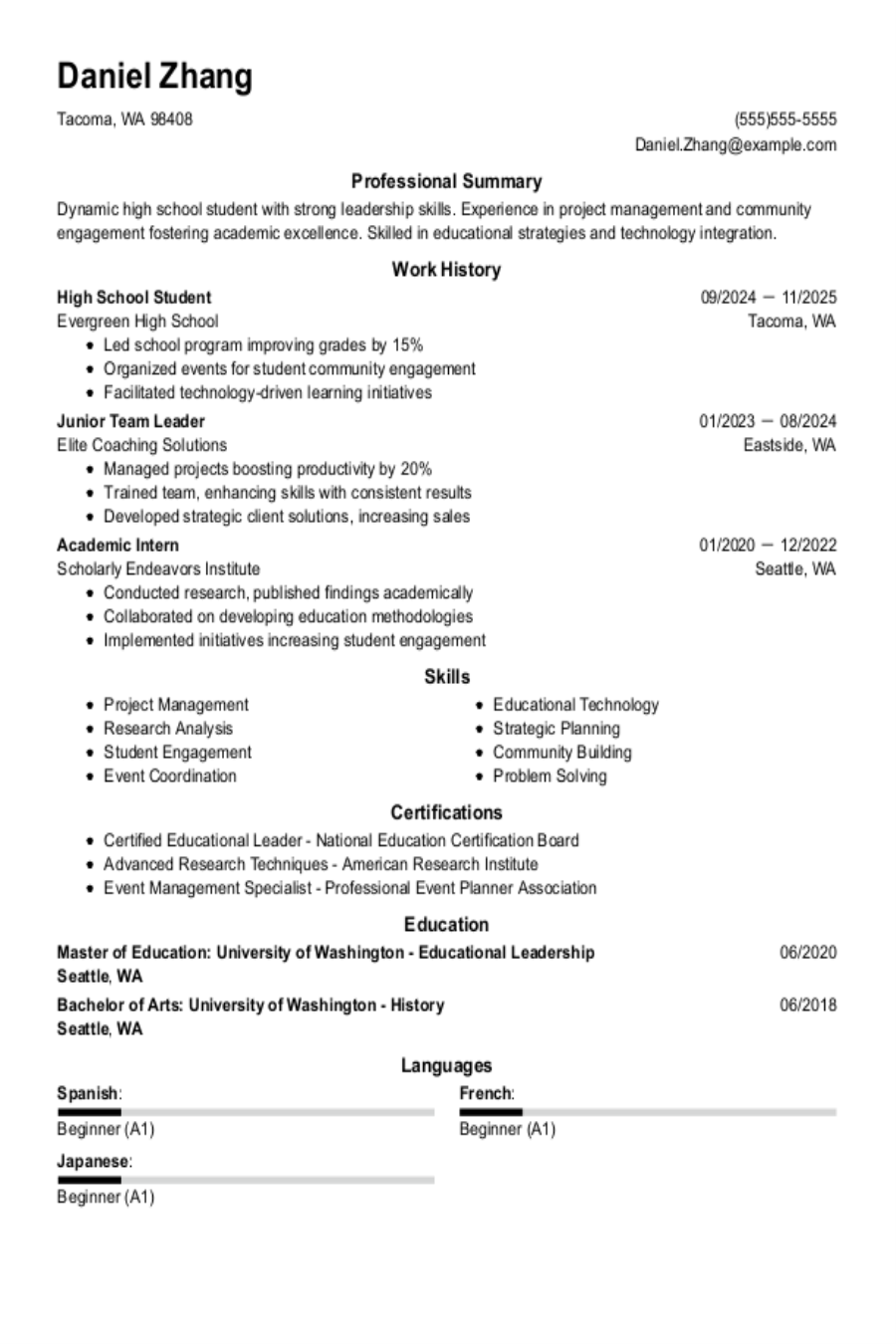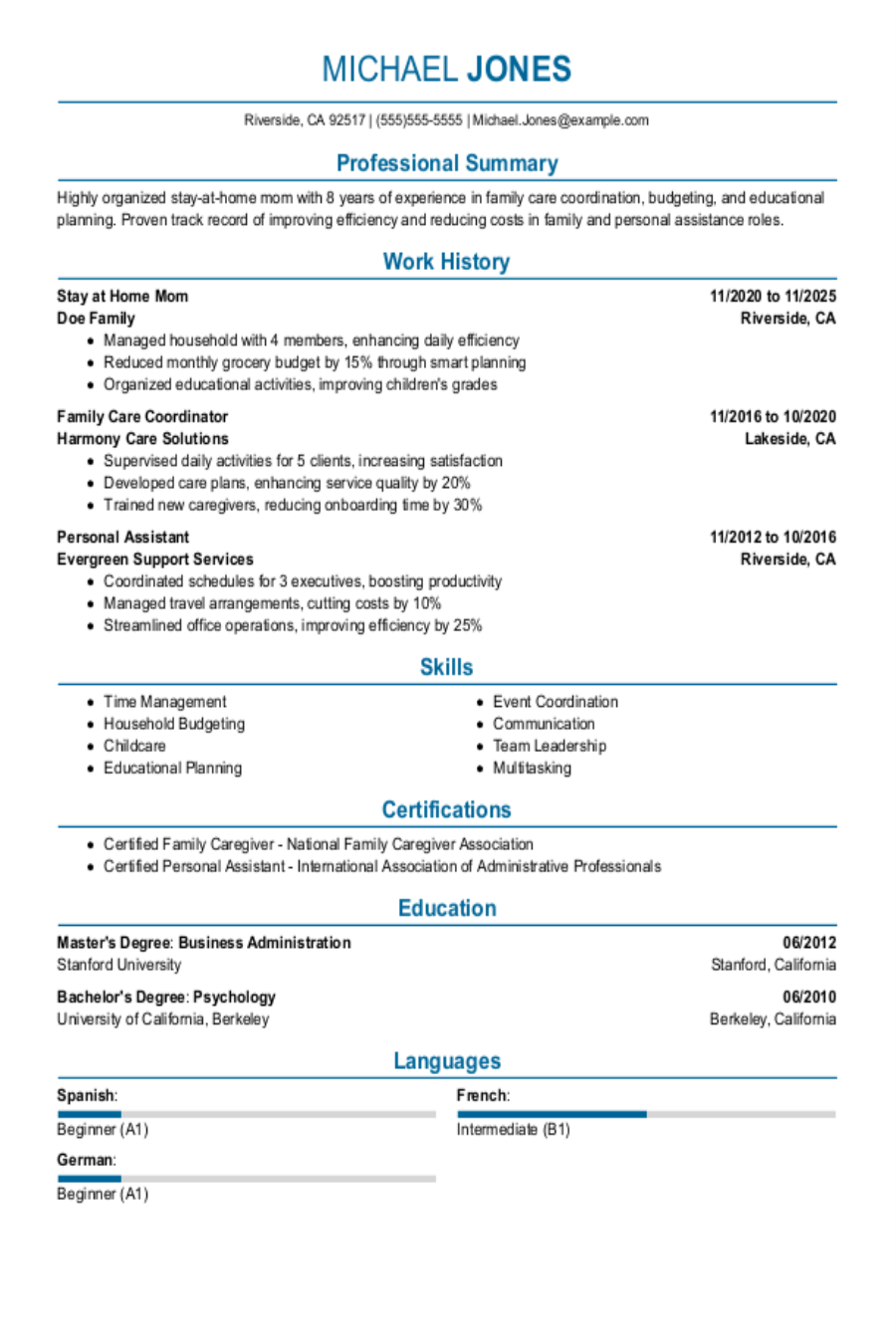Popular Biotechnologist Resume Examples
Mid-career biotechnologist resume
A mid-career resume should effectively showcase a combination of hands-on experience, technical skills, and continuous professional development to appeal to potential employers in the rapidly evolving biotech industry.
Active language: Using strong action verbs like "led," "developed," and "reduced" highlights initiative and tangible results, showcasing a proactive approach to improving efficiency in biotechnological processes.
Powerful resume profile: A well-crafted resume profile highlights key qualifications for a Biotechnologist by showcasing relevant experience and achievements. This allows recruiters and ATS to quickly recognize the job seeker's expertise in genetic analysis and project management.
Experienced biotechnologist resume
An experienced biotechnologist resume should highlight key research achievements, technical skills, and relevant work history in a clear format that demonstrates their professional growth and contributions to the field of biotechnology.
Numerical data: Quantifiable achievements are essential in showcasing a biotechnologist's impact, as they allow recruiters to easily assess the effectiveness of their contributions. By highlighting metrics like a 20% increase in assay efficiency, this jobseeker provides clear evidence of their capabilities and successes.
Concise professional summary: The resume's opening summary immediately emphasizes the job seeker's extensive 11 years of experience in biotechnology, showcasing their achievements in gene editing and research publication. This sets a professional tone, reflecting their capability to drive innovation and lead projects within the field.
No experience biotechnologist resume
A resume for an applicant with no experience in biotechnology, such as a recent graduate looking to land their first role after college, should highlight relevant coursework, laboratory skills, and any internships or volunteer work to demonstrate the applicant's foundational knowledge and commitment to the field.
Relevant coursework: Incorporating relevant coursework in molecular biology and genetic engineering illustrates the applicant's foundational knowledge, effectively showcasing readiness for a biotechnologist role despite limited hands-on experience.
Emphasis on professional skills: By highlighting relevant skills in molecular biology and laboratory techniques, the job seeker presents a strong case for their readiness as a biotechnologist, even with limited experience.
More resume examples
Biotechnologist Resume Template
Kickstart your career in biotechnology with this customizable resume template. Simply personalize it with your details to showcase your skills and experience effectively.
Donna Bryant
Parkview, MO 65702
(555)555-5555
Donna.Bryant@example.com
Professional Summary
Experienced biotechnologist with 4 years in biotech research. Proven track record in increasing productivity and reducing costs. Skilled in laboratory management and scientific writing.
Work History
Biotechnologist
Genova Biotech Solutions - Parkview, MO
August 2023 - July 2025
- Led experiments improving productivity by 20%
- Developed protocols reducing costs by ,000
- Supervised team ensuring 98% adherence to SOPs
Research Scientist
Innovative Life Sciences - St. Charles, MO
August 2021 - July 2023
- Conducted analysis increasing accuracy by 25%
- Compiled reports reducing review times by 15%
- Collaborated on projects yielding 5 patents
Lab Technologist
Precision Genomics Labs - Chesterfield, MO
August 2019 - July 2021
- Implemented assays enhancing detection rate 35%
- Trained staff cutting error rate by 12%
- Managed inventory saving ,000 annually
Skills
- DNA sequencing
- Protein purification
- Cell culture
- Data analysis
- PCR techniques
- Laboratory management
- Scientific writing
- Bioinformatics
Education
Master of Science Biotechnology
University of California, Berkeley Berkeley, California
July 2019
Bachelor of Science Biochemistry
University of California, Davis Davis, California
July 2017
Certifications
- Certified Biological Safety Officer - American Biological Safety Association
- RNA Sequencing Specialist - National Institutes of Health
- Advanced Biotech Methods - BioTech Institute
Languages
- Spanish - Beginner (A1)
- French - Beginner (A1)
- German - Intermediate (B1)
Writing Your Biotechnologist Resume
Having explored these strong resume examples, you're now equipped to dive into the detailed process of creating your own. We’ll guide you step by step through each section, ensuring you understand how to write a resume that stands out in the competitive field of biotechnology.
List your most relevant skills
Building a compelling skills section for your biotechnologist resume is important. Highlight both technical expertise, such as skill with lab equipment and data analysis software, and soft skills like teamwork and critical thinking. This dual emphasis not only showcases your well-rounded abilities but also positions you as an ideal applicant for the role.
To maximize effectiveness, integrate keywords from the job listing into your skills section. This approach signals to human recruiters that you meet their specific requirements while ensuring applicant tracking systems recognize you as a qualified match. By aligning closely with the job description, you improve your chances of making it through initial screenings and securing an interview opportunity.
Example of skills on a biotechnologist resume
- Proficient in conducting advanced genetic analysis and experimentation
- Experienced in operating and maintaining laboratory equipment for biotechnological processes
- Strong communicator with the ability to collaborate effectively across multidisciplinary teams
- Analytical thinker adept at troubleshooting complex biological problems
A strong skills section highlights both hard and soft skills. Striking a balance between the two is essential to show employers that you're qualified, experienced, and capable.
Highlight your work history
Your work experience section is an important part of your biotechnologist resume. This part of your resume should highlight what you did in previous roles and showcase your achievements. Focus on specific projects or results that demonstrate your expertise and the impact you've made. Using strong action verbs and industry-related keywords will help capture the attention of hiring managers.
When detailing each job entry, include essential information such as your job title, the name of the employer, and the dates you were employed. This information provides context to your work history and helps establish your credibility as a qualified professional in biotechnology. Make sure to articulate any significant contributions or innovations you introduced during your tenure.
Example of a biotechnologist work experience entry
- Biotechnologist
GenTech Innovations - San Diego, CA
June 2019 - Present - Conduct advanced research on genetic modifications to improve crop resistance, leading to a 30% increase in yield for partner farms
- Use CRISPR technology for precise gene editing, reducing development time for new plant varieties by 25%
- Collaborate with interdisciplinary teams to design and execute experimental protocols, ensuring compliance with safety regulations and industry standards
- Present findings at international conferences, improving the company's visibility and attracting potential investors
- Mentor junior scientists in laboratory techniques and data analysis, fostering a culture of knowledge sharing and innovation
Highlighting outcomes and achievements in your experience section is essential for capturing the attention of employers. This approach allows you to demonstrate how you made a difference, showcasing your problem-solving abilities and contributions to past projects. By presenting measurable results, you create a sense of impact and show employers that you're prepared to contribute to your next role.
Include your education
The education section of your biotechnologist resume should be organized in reverse-chronological order, beginning with your most recent degree. Include all relevant degrees and certifications while omitting your high school diploma if you hold a bachelor's degree or higher. This format allows potential employers to quickly assess your academic background.
For those currently engaged in further education or whose studies are incomplete, it is important to list your highest completed degree along with an expected graduation date. Additionally, consider including bullet points highlighting relevant coursework, research projects, or academic accolades that are relevant to the biotechnology field. This can be especially helpful for fresh graduates or current students.
Common certifications for a biotechnologist resume
- Certified Biotechnologist (CB) – American Society for Clinical Pathology (ASCP)
- Biotechnology Professional Certificate (BPC) – BioAcademy
- Certified Biomanufacturing Specialist (CBS) – National Institute for Biotechnology Education (NIBE)
- Regulatory Affairs Certification (RAC) – Regulatory Affairs Professionals Society (RAPS)
Showcase publications and research
Because biotechnology is an academic field, showcase publications on your resume to illustrate your expertise and contributions to the field. Publications serve as a testament to your research capabilities, innovative thinking, and commitment to advancing biotechnology.
You should create a dedicated publications section if you have several items to display. This allows potential employers to quickly identify your scholarly contributions. Alternatively, for one or two significant publications, consider integrating them into sections like education or relevant experience. Be sure to use the citation format preferred in your discipline (such as APA or MLA) for consistency and professionalism.
Example of a publications section
- Smith, J., Lee, T., & Patel, R. (2024). "Innovations in Gene Editing: CRISPR Applications". Journal of Biotechnology Advances, 40(1), 55-70.
- Doe, A. & Johnson, K. (2023). "Sustainable Practices in Biomanufacturing". Bioprocessing Journal, 15(2), 89-104.
- Research Contributor, Green Energy Initiative (2022–2023). "Research Contribution to Microbial Fuel Cells Project". Analyzed microbial interactions for energy conversion efficiency.
- Chen, H., Johnson, A., et al. (2022). "Collaborative Study on Plant-Based Vaccines". Vaccine Research Journal, 30(3), 120-135.
Sum up your resume with an introduction
Your resume profile is your chance to make a strong first impression, acting as a snapshot of your qualifications and career goals. You can begin with either a resume objective, focusing on your development and goals, or a professional summary that describes your career history and touches on the highlights of your resume.
Place your resume profile at the top of your resume to provide recruiters with immediate insight into what you bring to the table, making it easier for them to recognize your value.
Professional summary example
Dynamic biotechnologist with over 8 years of experience in research and development within the pharmaceutical sector. Demonstrated success in advancing drug formulation processes and improving product efficacy through innovative methodologies. Expertise in molecular biology, data analysis, and regulatory compliance ensures high-quality results that meet industry standards.
Resume objective example
Enthusiastic biotechnologist eager to use foundational knowledge in molecular biology and lab techniques to support innovative research initiatives. Committed to applying analytical skills and a strong attention to detail to drive successful project outcomes and contribute effectively to a collaborative scientific environment.
As a biotechnologist, your resume profile serves as an important first impression. It's also a great opportunity to incorporate relevant keywords from the job description, improving your chances of passing through applicant tracking systems (ATS).
Add unique sections to set you apart
Optional resume sections are a fantastic way for you to highlight your unique qualifications. These sections allow you to showcase not just your technical skills, but also the diverse experiences that make you a well-rounded job seeker.
By including relevant hobbies or volunteer work, you can demonstrate your values and commitment to the field. For instance, if you've volunteered in community health initiatives or participated in biotech workshops, these activities reflect your passion and dedication. Such insights into your professional life help potential employers see how you integrate your interests with your career, making you stand out as an exemplary job seeker in the biotechnology sector.
Three sections perfect for a biotechnologist resume
- Research experience: Your research background highlights your technical expertise in biotechnology. Include specific projects you've worked on, the techniques and technologies you've used, and any notable results or publications that reflect your contributions to the field.
- Patents or inventions: Holding patents demonstrates innovation and practical application of biotechnological knowledge. List any patents you've developed, including a brief description of the invention and its significance in advancing scientific understanding or commercial use.
- Continuing education and certifications: Ongoing learning showcases your dedication to staying current in this rapidly evolving field. Mention relevant courses, workshops, or certifications you have completed that improve your skill set and knowledge base in biotechnology.
5 Resume Formatting Tips
- Choose a format that matches your career stage.
Choosing the right resume format is important for showcasing your skills effectively. If you're a seasoned biotechnologist, the chronological format highlights your career progression. For those just starting out in biotechnology, a functional style can emphasize relevant skills and education instead. The combination format offers balance for mid-career candidates.
- Pick a smart resume template.
Choose a professional resume template to improve readability and streamline formatting. This method lets your qualifications shine clearly, making it easier for hiring managers to quickly digest your information. If you decide against using a template, prioritize simplicity by selecting fonts compatible with ATS systems to ensure your resume stands out effectively.
- Use an appropriate font.
Choose a clean, professional font to improve your resume's readability. Fonts like Helvetica, Garamond, or Verdana not only look polished but also ensure clarity for both ATS systems and hiring managers. It's best to avoid decorative or overly stylized fonts that may distract from your content.
- Use consistent formatting.
Ensure your resume features a left alignment with uniform margins to present a polished and cohesive look that captivates potential employers.
- Keep your resume to one or two pages.
When outlining your resume, remember that resumes should be one page long unless you have extensive experience to showcase. Focus on keeping your content concise and relevant to ensure hiring managers can quickly grasp your qualifications and achievements.
Tools for Your Job Search
Are you ready to advance your career as a biotechnologist? Before submitting your application for that exciting job opportunity, be sure to use our ATS Resume Checker. This insightful tool evaluates how well your resume aligns with the automated systems that many biotechnology firms rely on during the initial screening process.
Looking for a standout resume? Our AI Resume Builder can assist! It provides tailored suggestions specific to your biotechnological expertise and includes professionally designed templates that highlight your skills and achievements, helping you make a strong impression on hiring managers.
These innovative tools streamline the resume creation process by generating personalized sections that integrate seamlessly into your final document. By saving time, you can focus more on what truly matters—landing your dream role in biotechnology.
Frequently Asked Questions
Last Updated: September 3, 2025
Absolutely. A cover letter is important because it adds depth to your resume and offers you another chance to connect with potential employers. It allows you to express your enthusiasm for the position and demonstrate how your experience makes you an ideal applicant. Don't overlook this opportunity; write a cover letter that highlights your unique qualifications.
For a quick and efficient way to create a personalized cover letter, try our AI Cover Letter Generator. In just minutes, you can develop a compelling, job-specific cover letter. Plus, we offer various cover letter template options that perfectly match your resume, ensuring consistency in your application materials.
A resume is typically concise, spanning one to two pages, while a curriculum vitae (CV) can extend several pages and provides comprehensive details about your academic background, research contributions, publications, and professional experience.
You’ll need a CV for roles in academia, research positions, or specialized fields like law, medicine, and the sciences. As a biotechnologist, you should be prepared to write a CV. Our online CV Maker can help. It allows you to craft a tailored CV quickly and efficiently by choosing from various CV templates designed for different industries and career levels.
Selecting the right resume format is important and varies based on your career stage. Inexperienced job seekers often find the functional format beneficial as it highlights relevant skills over work history. For those with extensive experience, a chronological format is ideal since it showcases a robust employment track record. Mid-level professionals may prefer a combination format, which merges both experiences and skills to create a well-rounded presentation of their qualifications.
To build a strong skills section, merge your technical competencies—like laboratory techniques and data analysis—with important soft skills such as teamwork and communication. In your experience section, illustrate how you applied these technical skills to achieve significant research outcomes, emphasizing your contributions to successful projects.
Biotechnologists often begin their careers in laboratory technician roles, where they gain hands-on experience. With further education or specialized training, they can progress to senior research positions or managerial roles in biotech firms.
When crafting your resume as a biotechnologist, briefly highlight your aspirations in the summary section. However, use your cover letter to delve deeper into your career goals and how specific roles can facilitate your growth in the field. Target positions that not only match your skills but also offer opportunities for advancement and professional development, ensuring you're on a path to success.
Was this information helpful? Let us know!
Hailey is a career advice writer dedicated to helping job seekers excel in their careers.
More resources

What If No One Responds When You Try To Follow Up After a Job Interview?
If no one responds after you try to follow up after a job inte...

How to List Adaptability Skills on Your Resume (35+ Examples, Definition & Tips to Improve)
Our adaptability skills definition and guide will help you wri...

What if I Don't Have Professional References?
Access advice on what to do if you get to the reference check ...

Student Resume: 2025 Examples & Templates
As a student you need a resume that captures the attention of...

Stay At Home Mom Resume: Examples, Templates and Tips
As a stay-at-home mom building a resume that highlights your ...

Teen Resume: Examples, Template & Advice for Beginners
As a teen entering the job market you need a resume that show...

